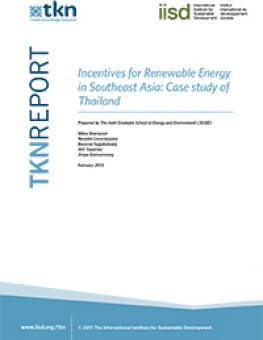
Incentives for Renewable Energy in Southeast Asia: Case study of Thailand
Global energy markets face rising challenges from the increasing scarcity of low-cost energy derived from fossil fuels
At the same time, there is a growing need to decouple economic growth from greenhouse gas emissions. Against this backdrop, developing countries face the additional challenge of increasing access to energy. These pressures have led to a growing focus on renewable energy technologies (RETs), as well as the introduction of support measures and incentives to encourage investment in renewable energy.
The governments of a number of Southeast Asian countries have started to address the economic and non-economic barriers to renewable energy deployment. They do this by introducing policies aimed at incentivizing renewable energy investment. This report reviews investment incentive policies and their effectiveness in addressing the perceived barriers to renewable energy deployment in Thailand. It begins by outlining the definitions and methodology used to define investment incentives and providing an overview of Thailand's power sector. It then describes policies to promote investment in renewable energy. Finally, it assesses the effectiveness of available incentives in addressing barriers and gives recommendations for increasing successful renewable energy deployment in Thailand.
You might also be interested in
Prioritizing Fossil-Fuel Subsidy Reform in the UNFCCC Process: Recommendations for short-term actions
A Citizens' Guide to Energy Subsidies in Thailand
The Cost of Fossil Fuel Reliance
Government support for fossil fuels reached at least USD 1.5 trillion in 2023, new data shows.
Increased Support Needed to Achieve India's Clean Energy Goals
India is on track to achieve many of its 2030 clean energy goals but needs to step up government support measures to accelerate the deployment of offshore wind, electric vehicles, and green hydrogen, according to a new report.